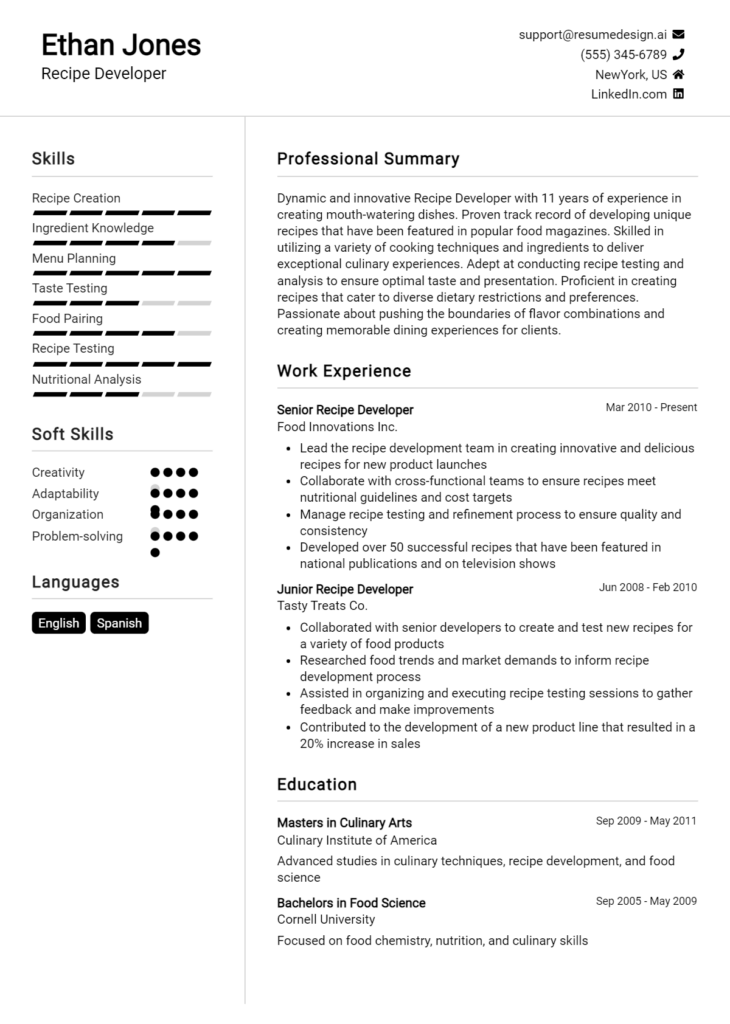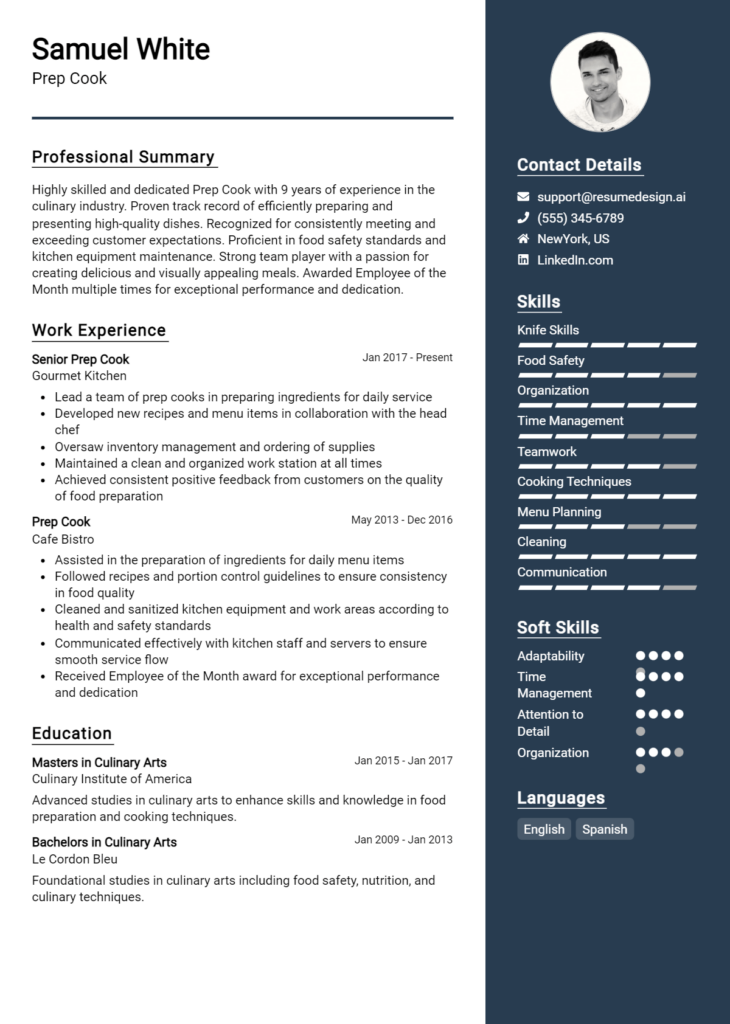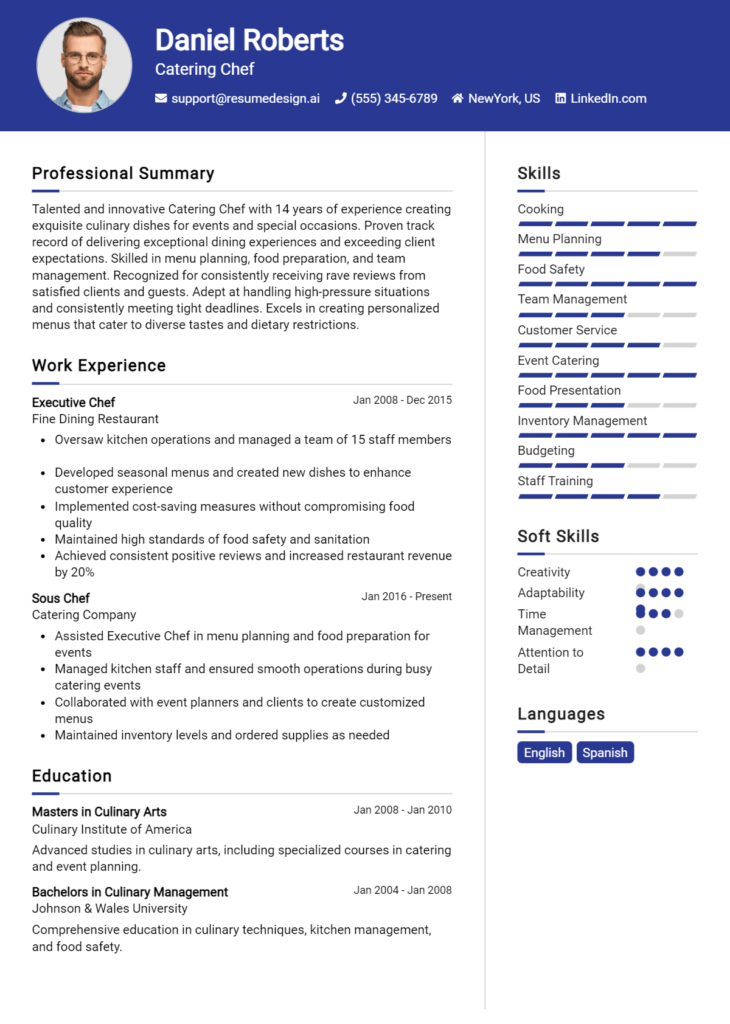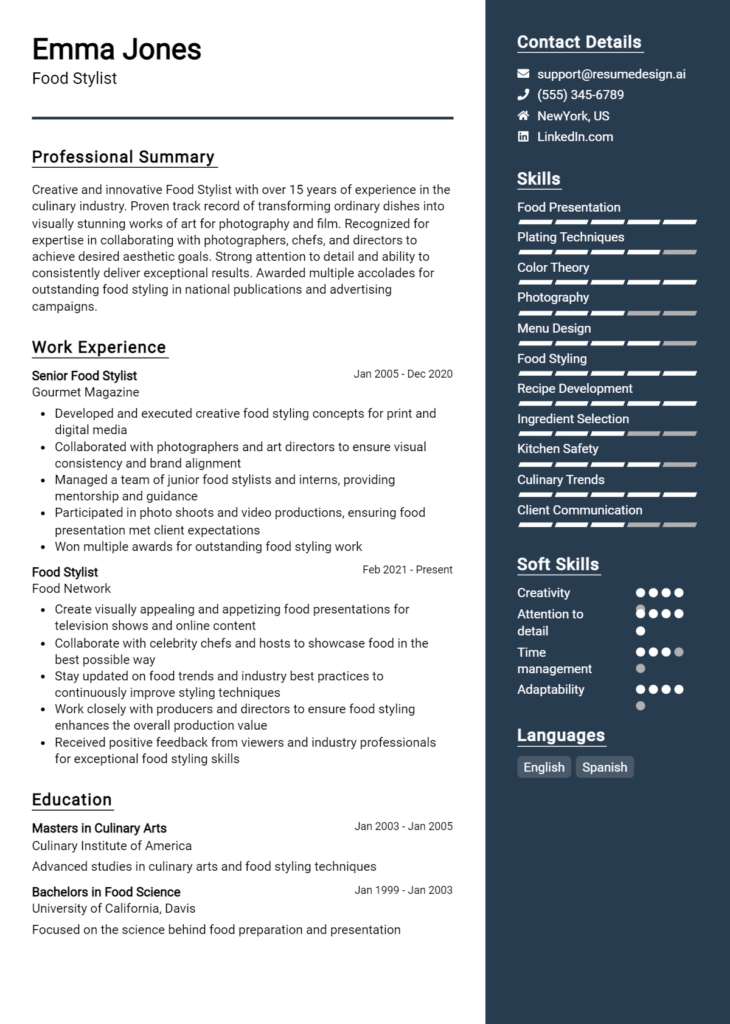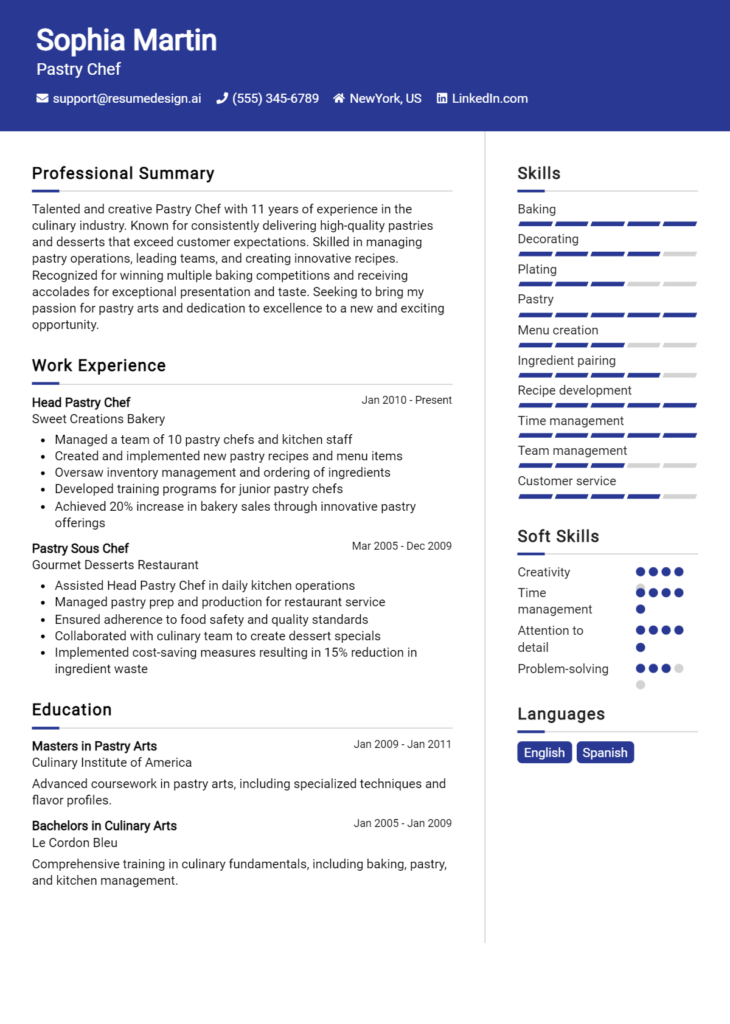Executive Chef Core Responsibilities
The Executive Chef plays a pivotal role in the culinary operations of an establishment, overseeing kitchen staff, menu development, and food quality. This position demands a blend of technical culinary skills, operational management, and problem-solving abilities to ensure efficient kitchen workflows and high standards. By bridging front-of-house and back-of-house functions, the Executive Chef significantly contributes to the organization's overall goals, emphasizing the need for a well-structured resume that showcases these qualifications to attract potential employers.
Common Responsibilities Listed on Executive Chef Resume
- Developing and designing innovative menus that align with seasonal trends and customer preferences.
- Managing kitchen operations, including staff recruitment, training, and performance evaluations.
- Ensuring compliance with health and safety regulations and maintaining sanitation standards.
- Overseeing food preparation and presentation to ensure quality and consistency.
- Controlling food costs and managing inventory effectively to minimize waste.
- Collaborating with suppliers to source high-quality ingredients at competitive prices.
- Implementing standard operating procedures for kitchen efficiency.
- Monitoring kitchen staff productivity and resolving operational challenges swiftly.
- Creating and maintaining budgets for kitchen operations and food-related expenses.
- Engaging with customers to receive feedback and enhance dining experiences.
- Staying updated on culinary trends and integrating them into the menu as appropriate.
High-Level Resume Tips for Executive Chef Professionals
In the competitive world of culinary arts, a well-crafted resume is vital for Executive Chef professionals seeking to impress potential employers. Your resume often serves as the first impression, a vital opportunity to showcase your culinary expertise, leadership skills, and unique achievements in the kitchen. A strong resume not only highlights your skills but also tells the story of your career journey, illustrating how you have contributed to the success of previous establishments. This guide will offer practical and actionable resume tips specifically tailored for Executive Chef professionals, ensuring your application stands out in a crowded field.
Top Resume Tips for Executive Chef Professionals
- Tailor your resume to match the job description, focusing on skills and experiences that align with the specific role.
- Showcase relevant experience by listing your most significant roles and responsibilities in reverse chronological order.
- Quantify your achievements with specific metrics, such as revenue growth, cost savings, or improvements in guest satisfaction ratings.
- Highlight industry-specific skills, such as menu development, kitchen management, and staff training, to demonstrate your expertise.
- Include certifications and education that are pertinent to the culinary field, such as culinary degrees or specialty courses.
- Utilize action verbs to describe your accomplishments and responsibilities, making your resume more dynamic and engaging.
- Incorporate keywords from the job posting to enhance the likelihood of passing through Applicant Tracking Systems (ATS).
- Use a clean and professional layout, with clear headings and bullet points for easy readability.
- Keep your resume concise, ideally one to two pages, focusing on the most relevant and impactful information.
- Consider including a personal statement or summary at the top, highlighting your culinary philosophy and leadership style.
By implementing these tips, you can significantly increase your chances of landing a job in the Executive Chef field. A polished and targeted resume not only showcases your qualifications but also demonstrates your commitment to excellence and your passion for culinary artistry, making you a compelling candidate for any kitchen leadership role.
Why Resume Headlines & Titles are Important for Executive Chef
In the competitive culinary industry, an Executive Chef's resume must stand out to capture the attention of hiring managers. Resume headlines and titles play a critical role in this process, acting as the first impression a candidate makes on prospective employers. A well-crafted headline or title can succinctly summarize a candidate's key qualifications and professional identity in one impactful phrase. This not only grabs attention but also sets the tone for the rest of the resume. It should be concise, relevant, and directly related to the specific job being applied for, ensuring that hiring managers can quickly assess the applicant's suitability for the role.
Best Practices for Crafting Resume Headlines for Executive Chef
- Keep it concise: Aim for a headline that is brief, ideally 5-10 words.
- Be role-specific: Tailor your headline to match the Executive Chef position you are applying for.
- Highlight achievements: Incorporate significant accomplishments or certifications that differentiate you.
- Use powerful adjectives: Choose strong descriptive words that convey expertise and leadership.
- Include relevant keywords: Use industry terminology that aligns with the job description.
- Avoid generic terms: Steer clear of vague phrases that do not communicate your unique value.
- Showcase your culinary style: Reflect your culinary philosophy or specialties if applicable.
- Test for clarity: Ensure your headline clearly conveys your role and experience at a glance.
Example Resume Headlines for Executive Chef
Strong Resume Headlines
Innovative Executive Chef with 10+ Years in Fine Dining Excellence
Award-Winning Executive Chef Specializing in Farm-to-Table Cuisine
Dynamic Executive Chef Known for Transforming Culinary Concepts into Reality
Experienced Executive Chef with Proven Track Record in Menu Development and Team Leadership
Weak Resume Headlines
Chef Looking for a Job
Executive Chef with Experience
Strong headlines are effective because they are specific, dynamic, and highlight the candidate's unique strengths, making it easy for hiring managers to see the value they would bring to the kitchen. In contrast, weak headlines fail to impress because they are vague and lack the detail necessary to stand out in a competitive field, leaving the hiring manager with little information about the candidate’s qualifications or expertise.
Writing an Exceptional Executive Chef Resume Summary
In the competitive culinary industry, a well-crafted resume summary for an Executive Chef is crucial in making a lasting first impression. A strong summary serves as a powerful introduction that quickly captures the attention of hiring managers by highlighting key skills, relevant experience, and notable accomplishments. It acts as a snapshot of the candidate's qualifications, offering a concise yet impactful overview that is tailored to the specific job they are applying for. An effective resume summary can set the tone for the rest of the resume, increasing the likelihood of being invited for an interview.
Best Practices for Writing an Executive Chef Resume Summary
- Quantify Achievements: Use numbers to demonstrate your impact, such as percentage increases in customer satisfaction or food cost savings.
- Focus on Core Skills: Highlight culinary techniques, management skills, and specialty cuisines that are relevant to the position.
- Tailor to Job Description: Customize your summary to align with the specific requirements and responsibilities outlined in the job posting.
- Showcase Leadership Experience: Mention your experience in managing kitchen staff and training team members to illustrate your leadership capabilities.
- Emphasize Culinary Creativity: Showcase any unique dishes or concepts you've developed that distinguish you from other candidates.
- Highlight Awards and Recognitions: Include any accolades or certifications that validate your culinary expertise and commitment to excellence.
- Keep It Concise: Aim for a summary that is no longer than 3-4 sentences to maintain the hiring manager's attention.
- Use Active Language: Write in a dynamic manner to convey enthusiasm and confidence in your abilities.
Example Executive Chef Resume Summaries
Strong Resume Summaries
Dynamic Executive Chef with over 10 years of experience leading high-volume kitchens, achieving a 25% reduction in food costs while maintaining a 95% customer satisfaction rating. Expertise in Mediterranean cuisine, complemented by a passion for innovative menu design and team development.
Creative Executive Chef recognized for transforming dining experiences in upscale restaurants, resulting in a 40% increase in repeat customers. Adept at training and mentoring culinary teams, implementing seasonal menus that highlight local ingredients.
Results-oriented Executive Chef with a proven track record of managing culinary operations for prestigious establishments. Successfully launched a new fine dining concept that garnered a Michelin star within its first year, showcasing exceptional leadership and culinary innovation.
Weak Resume Summaries
Experienced chef looking for a management position in a restaurant. I have worked in kitchens for many years and enjoy cooking.
Skilled in cooking and kitchen management. Seeking to contribute my skills in a new role as an Executive Chef.
The strong resume summaries are considered effective because they provide specific, quantifiable achievements, demonstrate relevant skills and expertise, and are tailored to the role of an Executive Chef. In contrast, the weak summaries are vague and lack detail, failing to highlight any measurable impact or unique qualifications that would set the candidate apart from others. This distinction is vital for capturing the attention of hiring managers in a competitive job market.
Work Experience Section for Executive Chef Resume
The work experience section of an Executive Chef resume is critical in demonstrating a candidate's journey through the culinary landscape. This section provides potential employers with insights into the candidate's technical skills, their ability to manage and inspire kitchen teams, and their commitment to delivering high-quality food products. By quantifying achievements, such as revenue growth or menu innovation, and aligning experiences with industry standards, candidates can effectively showcase their capability to excel in demanding culinary environments and contribute to the overall success of their establishments.
Best Practices for Executive Chef Work Experience
- Highlight specific culinary techniques and cuisines mastered.
- Quantify achievements, such as percentage increases in customer satisfaction or revenue growth.
- Emphasize leadership experiences, such as team management or mentorship roles.
- Detail collaboration with other departments, such as front-of-house staff or suppliers.
- Incorporate industry standards, certifications, and awards received.
- Utilize action verbs to convey a sense of proactivity and impact.
- Focus on results-driven statements that reflect innovation and efficiency.
- Customize experiences to align with the job description of the position being applied for.
Example Work Experiences for Executive Chef
Strong Experiences
- Managed a team of 15 culinary staff, resulting in a 30% increase in kitchen efficiency and a 20% boost in customer satisfaction scores over one year.
- Developed a seasonal menu that increased revenue by 25% within the first three months of launch, showcasing innovative use of local ingredients.
- Implemented a new food safety protocol that reduced waste by 15% and improved compliance scores during health inspections.
- Collaborated with front-of-house management to create a cross-training program, enhancing service delivery and team synergy, leading to a 40% decrease in staff turnover.
Weak Experiences
- Worked in a kitchen.
- Helped with food preparation tasks.
- Was responsible for managing some staff.
- Participated in menu development.
The examples categorized as strong are characterized by their specificity and quantifiable results, demonstrating a clear impact on the kitchen's efficiency, revenue, and team dynamics. These statements highlight a proactive approach and a strong leadership role within the culinary environment. In contrast, the weak experiences lack detail and fail to convey any substantial contributions or achievements, making them less compelling to potential employers.
Certifications and Education for a Executive Chef Resume
When crafting a resume for an Executive Chef position, it is essential to highlight your educational background and relevant certifications. These elements not only demonstrate your culinary expertise but also your commitment to professional development within the culinary arts. Here are some guidelines for listing certifications and education effectively:
Prioritize Relevant Certifications: Focus on industry-recognized certifications that showcase your skills and knowledge in culinary techniques, food safety, and management. Certifications such as the Certified Executive Chef (CEC) from the American Culinary Federation (ACF) can significantly enhance your credibility.
Include Specialized Training: If you have completed specialized training programs, especially those related to specific cuisines or culinary techniques (such as pastry arts or nutrition), be sure to include them. This can set you apart from other candidates.
Educational Background: Clearly list your formal education, including any degrees you have earned in culinary arts or related fields. This can show a strong foundation in cooking principles and management practices.
Examples of Relevant Educational Backgrounds:
Culinary Arts Degree: A degree from an accredited culinary school, such as an Associate's or Bachelor's in Culinary Arts, provides foundational knowledge and skills necessary for an Executive Chef role.
Hospitality Management Degree: A degree in Hospitality Management can be beneficial, as it covers essential topics like restaurant operations, marketing, and customer service, which are crucial for managing a kitchen and a team.
Food Safety Certification: Obtaining a food safety certification, such as ServSafe, demonstrates your commitment to maintaining high standards for food preparation and handling, which is vital for any leadership role in the kitchen.
Specialty Culinary Certifications: Certifications in areas like baking and pastry, international cuisine, or nutrition can enhance your resume further by showcasing your versatility and specialized skills.
When listing these credentials, be sure to include the name of the institution, the certification or degree earned, and the date of completion. This structured approach will help you present your qualifications in a clear and professional manner, making it easier for hiring managers to assess your fit for the Executive Chef position.
Top Skills & Keywords for Executive Chef Resume
An Executive Chef is a pivotal role in the culinary world, responsible for not only creating exceptional dishes but also for managing the kitchen staff and operations. The skills showcased in an Executive Chef resume are crucial, as they demonstrate the candidate’s ability to lead a kitchen, maintain high standards of food quality, and ensure efficient kitchen operations. A well-crafted resume highlights both hard and soft skills, giving potential employers a comprehensive view of the candidate's qualifications. By emphasizing the right skills, an Executive Chef can effectively illustrate their expertise and readiness to tackle the demands of this challenging role.
Top Hard & Soft Skills for Executive Chef
Soft Skills
- Leadership
- Communication
- Team Management
- Problem-Solving
- Creativity
- Time Management
- Adaptability
- Attention to Detail
- Customer Service
- Conflict Resolution
- Stress Management
- Mentoring and Training
- Interpersonal Skills
- Multitasking
- Collaboration
- Cultural Awareness
Hard Skills
- Menu Development
- Food Safety and Sanitation
- Inventory Management
- Cost Control
- Cooking Techniques
- Nutrition Knowledge
- Kitchen Equipment Proficiency
- Recipe Development
- Plating and Presentation
- Food Storage and Preservation
- Catering Management
- Quality Assurance
- Vendor Relations
- Budgeting and Forecasting
- Culinary Trends Awareness
- Event Planning
Stand Out with a Winning Executive Chef Cover Letter
Dear [Hiring Manager's Name],
I am writing to express my enthusiastic interest in the Executive Chef position at [Restaurant/Company Name]. With over [X years] of culinary experience and a passion for creating innovative and exquisite dishes, I am excited about the opportunity to lead your kitchen team. My background in managing multi-functional kitchen environments and my commitment to culinary excellence align perfectly with your establishment's dedication to providing an unforgettable dining experience.
Throughout my career, I have cultivated a diverse range of culinary skills, from crafting seasonal menus that highlight local ingredients to implementing efficient kitchen workflows that enhance productivity and reduce waste. At [Previous Employer], I successfully led a team of [X chefs] and increased overall kitchen efficiency by [X%] while maintaining a high standard of food quality. My leadership style focuses on fostering creativity and collaboration, allowing each team member to bring their unique talents to the table. I believe that a harmonious kitchen environment not only boosts morale but also results in exceptional dishes that delight guests.
I am particularly drawn to [Restaurant/Company Name] because of your commitment to [specific aspect of the restaurant or culinary philosophy], which resonates with my own culinary ethos. I am eager to bring my expertise in [specific cuisine or technique] and my dedication to sustainable sourcing to your team. Together, I am confident we can elevate the dining experience and create memorable moments for your guests.
Thank you for considering my application. I look forward to the opportunity to discuss how my leadership skills and culinary vision align with the goals of [Restaurant/Company Name]. I am excited about the possibility of contributing to your esteemed establishment and helping to create extraordinary culinary experiences.
Sincerely,
[Your Name]
[Your Phone Number]
[Your Email Address]
Conclusion
In conclusion, the role of an Executive Chef is not just about culinary expertise but also encompasses leadership, creativity, and business savvy. Throughout the article, we explored the essential skills required for this position, including menu development, staff management, and financial acumen. We also highlighted the importance of staying current with culinary trends and maintaining high standards of food safety and quality.
As you reflect on your career as an Executive Chef, now is the perfect time to ensure your resume showcases your unique skills and experiences. A well-crafted resume can make a significant difference in standing out to potential employers in a competitive industry.
To help you in this process, we encourage you to take advantage of our resources. Check out our resume templates to find a design that complements your style, or utilize our resume builder for a streamlined experience in creating your document. Additionally, don’t overlook the importance of a compelling cover letter; our cover letter templates can guide you in crafting a persuasive narrative to accompany your resume.
Take action today to revamp your Executive Chef resume and put your best culinary foot forward!

